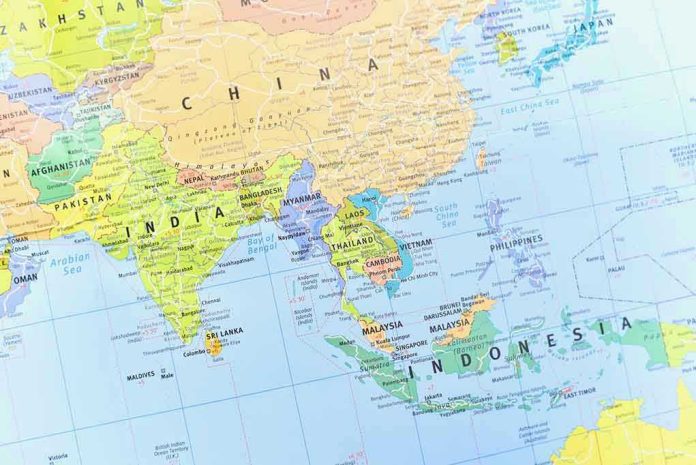
The long-standing border dispute between Cambodia and Thailand has erupted into a dangerous military confrontation, leaving the world on edge and travelers warned to steer clear.
At a Glance
- China warns citizens to avoid the Cambodia-Thailand border amid escalating military clashes.
- Thailand launches air strikes, while Cambodia retaliates with artillery fire.
- International travel advisories issued due to the heightened risk of conflict.
- Past diplomatic efforts have failed to resolve underlying territorial disputes.
Escalation at Cambodia-Thailand Border
The border between Cambodia and Thailand, a region marred by decades of tension, has once again become a flashpoint. On July 24, 2025, Thailand reportedly launched air strikes against Cambodian military targets, sparking retaliation from Cambodia with rockets and artillery fire. This sudden flare-up marks the most significant military engagement in the area in over a decade, reminiscent of the 2008-2011 clashes that resulted in casualties and displacement.
The root of this conflict stretches back to historical disagreements over demarcation lines and sovereignty, especially around the Preah Vihear Temple. The International Court of Justice ruled in 1962 that the temple belonged to Cambodia, but the surrounding land remains disputed. The border region, characterized by its rural landscape and history of illicit activities, has become a theater for military posturing, with significant forces from both countries stationed nearby. These conditions have set the stage for accidental or intentional clashes, escalating tensions to the brink of open conflict.
International Concerns and Responses
The escalation has prompted China to issue a travel advisory, warning its citizens to avoid the border area due to the increased threat of violence. The Chinese Embassy in Cambodia emphasized the need for vigilance and personal safety. This advisory is part of a broader international reaction, with countries like the US, UK, Canada, Australia, and Hong Kong also issuing travel warnings. These precautions highlight the growing international concern over the situation’s potential to destabilize the region further.
Diplomatic efforts to resolve the crisis have so far been unsuccessful. The Chinese government, with its significant economic leverage and influence in both Cambodia and Thailand, is likely to play a crucial role in any future negotiations. Meanwhile, the international community remains on high alert, hoping to prevent an escalation that could draw in external actors and further strain regional stability.
Impact and Implications
The immediate impact of the conflict is severe, posing a direct threat to civilians and foreign nationals in the border region. The disruption of cross-border trade and travel has already begun to affect local economies, exacerbating the hardships faced by border communities. As both nations maintain heightened military alerts, the risk of further escalation remains a pressing concern. The potential for a protracted conflict looms large if diplomatic solutions are not found swiftly.
Long-term implications include strained bilateral relations and possible regional repercussions, as the involvement of external actors like China and ASEAN becomes more likely. The economic losses from disrupted trade and tourism, coupled with rising social tensions and humanitarian concerns, underscore the conflict’s broader impact. Political pressure mounts on both governments to demonstrate resolve while avoiding a wider conflict.
Expert Opinions and Analysis
Security analysts warn that the use of air strikes signifies a significant escalation, increasing the risk of a broader conflict. Regional experts point to unresolved historical grievances and the limitations of past diplomatic efforts as key factors fueling the current tensions. Scholars note that border disputes in Southeast Asia often reflect deeper issues of national identity and post-colonial boundaries.
Some commentators argue that domestic political pressures in both Cambodia and Thailand are driving the escalation, while others emphasize the risk of miscalculation and unintended consequences given the proximity of military forces. Credible reports from major news agencies and official embassy statements provide consistent accounts of the escalation and travel advisories, reinforcing the urgency of the situation.














